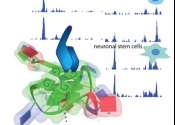What can sea squirts tell us about neurodegeneration?
A tiny marine creature with a strange lifestyle may provide valuable insights into human neurodegenerative disorders, such as Alzheimer's disease, according to scientists at Stanford Medicine.

A tiny marine creature with a strange lifestyle may provide valuable insights into human neurodegenerative disorders, such as Alzheimer's disease, according to scientists at Stanford Medicine.
Cell & Microbiology
Aug 1, 2022
0
139

Weill Cornell Medicine and New York Genome Center researchers, in collaboration with Oxford Nanopore Technologies, have developed a new method to assess on a large scale the three-dimensional structure of the human genome, ...
Biotechnology
Jun 23, 2022
0
108

The origins of our blood may not be quite what we thought. Using cellular "barcoding" in mice, a groundbreaking study finds that blood cells originate not from one type of mother cell, but two, with potential implications ...
Cell & Microbiology
Jun 15, 2022
0
136

Using a next generation sequencing analysis to examine human endogenous retrovirus (HERV) integration sites, researchers from Kumamoto University, the National Institute of Genetics (Japan), and the University of Michigan ...
Molecular & Computational biology
May 27, 2022
0
41

The first fully private mission reached the International Space Station early Saturday with a four-member crew from startup company Axiom Space.
Space Exploration
Apr 9, 2022
1
432

The mystery is being unraveled of why the control centers, or nuclei, of certain blood cancer cells have a distinctly odd shape.
Cell & Microbiology
Mar 28, 2022
0
51

With help from the best tweezers in the world, a team of researchers from the University of Copenhagen has shed new light on a fundamental mechanism in all living cells that helps them explore their surroundings and even ...
Cell & Microbiology
Mar 28, 2022
0
83

Every year, thousands of biochemistry majors and medical students around the world learn to memorize the major biochemical pathways that allow cells to function. How these 10 or so pathways are described in textbooks hasn't ...
Cell & Microbiology
Mar 9, 2022
0
139

Scientists have shown for the first time that fat inside adult muscle stem cells regulates their fate.
Cell & Microbiology
Jan 24, 2022
0
128

While investigating the unusual G quadruplex DNA structure (G4), the Simon Elsässer group has developed a more accurate method for mapping these structures in the genome. G4 CUT&Tag revealed numerous G4s in the human and ...
Biotechnology
Dec 6, 2021
0
52